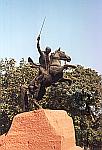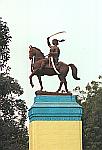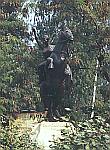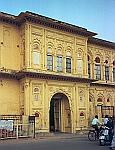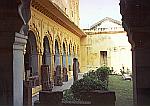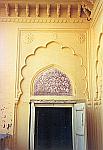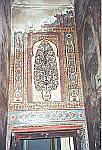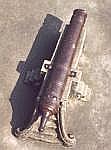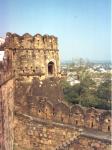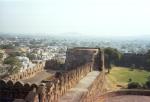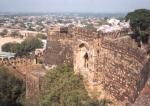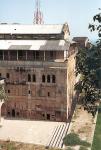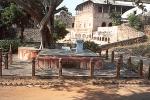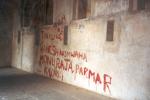LakshmibaiHomeForeword Warning Site Map BiographyTimelineEarly life Annexation Mutiny and Rebellion Epilogue The Victims Myths Area Map Martin Enigma Family Tree Godse's Account Lang's Account QuotationsOn LakshmibaiSuppression CommentaryAccusationsQ and A Why not a War? Source materialGalleryRelated Links Bibliography Documents OtherPrinter versionTech Stuff |
A few images I have culled from books (and not well scanned either) and a couple of my own snaps. The links page has links to other sites with other images.
The images will appear in a separate pop-up style window which with sensible placing of the windows will enable you to simply click through the images.
With reference to the statues of the Rani which all show her on horseback, there is a story that there is a convention that if the horse has both front feet off the ground then the rider died in battle, if it is just one foot the rider died of wounds received in battle, and with all four feet planted on the ground then the rider survived all battles. This is a myth, see Snopes.com. My thanks to Alok Mohan for this information.
- Portrait of the young Rani, possibly about the time of her wedding
- Portrait of the Rani as on the home page
- Stylised Portrait of the Rani A portrait said to be of Lakshmibai dated about 1860/70 from the British Library's Images Online Collection (Shelfmark: Add.Or.2607)
- Portrait of the RaniA stylised portrait of the Rani from about 1890 now in the V & A Museum, London and reproduced with their permission
- A solution to the supposed photograph of the Rani published in V.D. Savakar's 1909 book 'The Indian War of Independence'.
- Statue of the Rani in Pune
- Seal of the Rani of Jhansi
- Mahalakshmi Temple, Jhansi
- The scene of the massacre of the British in Jhansi - Jokan Bagh
- The Death of Captain Skene and his Family A fanciful Victorian print
- Jhansi Fort
- General Sir Hugh Rose
- Tantia Tope photographed as a prisoner. (Thanks to Rafael Graf Waldburg-Zeil for sending me this image.)
- Bhanderi Gate in Jhansi town wall through which the Rani made her escape
- The Battle of Betwa A Victorian print
- Gwalior Fort
- The possible place where Lakshmibai was mortally wounded
- The spot where she was cremated
Some recent snaps from Jhansi and Gwalior
Clicking on the thumbnail will pop up a window showing a larger image, as above.
Next: Related Links
Last modified: 2007-05-05 17:33:55.000000000
